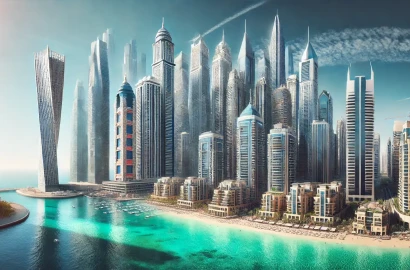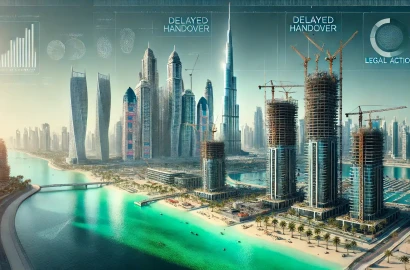Dubai's real estate market has become a lucrative investment opportunity in recent years. There are numerous reasons why investing in Dubai's real estate market is a wise choice. In this article, we will explore each of these reasons in-depth and explain why it's a good time to invest in Dubai's real estate market.
Introduction to Dubai's Real Estate Market
Dubai's real estate market has seen exponential growth in recent years, making it one of the most active and dynamic markets in the world. The market has attracted both local and international investors who are seeking lucrative investment opportunities. Dubai's growing population, thriving economy, strategic location, favorable tax policies, innovative infrastructure, booming tourism industry, diverse property market, high rental yields, flexible payment plans, resilient real estate regulations, sustainable development, luxury real estate market, affordable housing options, real estate investment trusts (REITs), real estate brokerage industry, real estate market trends, and future outlook all contribute to the attractiveness of the Dubai real estate market.
Dubai's Growing Population
Dubai's population has been growing steadily over the years, fueled by an influx of expatriates and a higher birth rate. According to the Dubai Statistics Center, the population of Dubai is projected to reach 3.5 million by 2030, up from 2.7 million in 2021. This growth in population has led to an increased demand for housing, making the real estate market a lucrative investment opportunity. In addition, the growing population has also resulted in an increase in the number of businesses, which has driven demand for commercial real estate.
Dubai's Thriving Economy
Dubai's economy is driven by several industries, including tourism, real estate, finance, and trade. The city's strategic location at the crossroads of Europe, Asia, and Africa has made it a hub for trade and commerce. The government has also implemented policies to encourage foreign investment and diversify the economy, which has led to a thriving business environment and increased demand for real estate. In addition, the city's economy has remained resilient in the face of global economic downturns, making it a stable investment destination.
Dubai's Strategic Location
Dubai's location at the crossroads of Europe, Asia, and Africa has made it a strategic hub for international trade and commerce. The city's ports and airports are among the busiest in the world, making it a convenient and efficient hub for global business. This has led to increased demand for real estate, particularly in areas close to the ports and airports. In addition, Dubai's location also makes it an attractive destination for tourists, which has driven demand for short-term rental properties.
Dubai's Favorable Tax Policies
Dubai's tax policies are among the most favorable in the world, with no personal income tax, corporate tax, or value-added tax (VAT). This has made the city an attractive destination for businesses and investors looking to minimize their tax burden. It has also led to increased demand for real estate, particularly from international investors who are seeking to invest in a tax-efficient jurisdiction.
Dubai's Innovative Infrastructure
Dubai has invested heavily in its infrastructure in recent years, with projects like the Dubai Metro, Dubai Water Canal, and Dubai Creek Harbour transforming the city's landscape. The government has also announced plans to invest in new projects, including the Dubai South development and the Dubai Expo 2020 site. This innovative infrastructure has made the city more attractive to investors, particularly in areas close to these new developments.
Dubai's Booming Tourism Industry Dubai's tourism industry has been growing rapidly in recent years, with the city welcoming more than 16 million visitors in 2019. The government has implemented policies to encourage tourism, including visa-free travel for citizens of more than 100 countries. The city's infrastructure and amenities, such as world-class shopping centers, theme parks, and hotels, have also contributed to its popularity among tourists. This has created an opportunity for investors to invest in short-term rental properties, which can generate high rental yields.
Dubai's Diverse Property Market
Dubai's property market is diverse, with a range of options available to suit different investment strategies. The market offers a variety of properties, including apartments, villas, townhouses, and commercial properties. In addition, properties are available at different price points, making it possible for investors with different budgets to invest in the market.
Dubai's High Rental Yields
Dubai's real estate market offers high rental yields compared to other global markets. According to the Dubai Land Department, the average rental yield in Dubai is around 7%, which is significantly higher than other major cities such as London, New York, and Hong Kong. This high rental yield is attractive to investors looking for a steady stream of income from their real estate investments.
Dubai's Flexible Payment Plans
Dubai's real estate market offers flexible payment plans to investors, making it easier for them to invest in the market. Developers offer payment plans that allow investors to pay for properties over an extended period, usually up to five years. This makes it possible for investors to invest in properties without having to make large upfront payments.
Dubai's Real Estate Regulations
Dubai's real estate market is regulated by the Dubai Land Department (DLD), which has implemented a range of regulations to protect investors and ensure transparency in the market. The DLD has implemented regulations such as the Real Estate Regulatory Agency (RERA), which oversees the registration of real estate brokers and developers, and the Escrow Account Law, which requires developers to deposit funds in escrow accounts to protect buyers' investments.
Dubai's Resilience in Times of Crisis
Dubai's real estate market has demonstrated resilience in times of crisis, such as the global financial crisis of 2008 and the COVID-19 pandemic. The market has rebounded quickly from these crises, with property prices recovering within a few years. This resilience is due to the government's proactive approach to managing the economy and its ability to attract foreign investment.
Dubai's Sustainable Development
Dubai has made sustainability a key priority in its development plans, with the government investing heavily in green initiatives and renewable energy. The city has implemented policies to reduce carbon emissions and increase energy efficiency in buildings, which has made it an attractive destination for environmentally-conscious investors.
Dubai's Luxury Real Estate Market
Dubai's luxury real estate market is among the most sought-after in the world, with properties such as the Burj Khalifa, Palm Jumeirah, and Emirates Hills attracting high net worth individuals from around the globe. The luxury market offers a range of properties, including villas, penthouses, and apartments, and is characterized by high-end amenities and exceptional design.
Dubai's Affordable Housing Options
Dubai's real estate market also offers affordable housing options, which are in high demand among middle-class families and young professionals. The government has implemented policies to encourage the development of affordable housing, including the Mohammed bin Rashid Housing Establishment, which provides subsidized housing for Emiratis.
Dubai's Real Estate Investment Trusts (REITs)
Real Estate Investment Trusts (REITs) are publicly traded companies that invest in income-generating real estate assets. Dubai's real estate market offers investors the opportunity to invest in REITs, which are listed on the Dubai Financial Market (DFM) and NASDAQ Dubai. The REITs in Dubai typically invest in commercial properties such as office buildings, shopping centers, and hotels. REITs offer investors a way to invest in the real estate market without having to purchase and manage properties themselves. REITs also provide investors with a regular income stream through dividend payments.
Dubai's Real Estate Brokerage Industry
The real estate brokerage industry in Dubai is highly competitive, with numerous players vying for a share of the market. Real estate brokers in Dubai are regulated by the Dubai Land Department (DLD) and must be licensed to operate. The brokerage industry offers a range of services, including property valuations, property management, and investment advice. Brokers also play a key role in facilitating real estate transactions and providing market insights to investors.
Dubai's Real Estate Market Trends
Dubai's real estate market has experienced significant growth in recent years, driven by a range of factors such as population growth, economic diversification, and infrastructure development. The market has also undergone several transformations, with the introduction of new regulations, the implementation of sustainable development practices, and the emergence of new investment opportunities such as REITs. The market has also seen a shift towards off-plan properties, which allow investors to purchase properties before they are completed.
Dubai's Future Outlook
The future outlook for Dubai's real estate market is positive, with the government implementing policies to encourage foreign investment, economic diversification, and sustainable development. The city's infrastructure development plans, such as the Dubai South development and the Dubai Expo 2020 site, are expected to drive demand for real estate in the coming years. In addition, the city's focus on sustainability is expected to attract environmentally-conscious investors. While the market may face challenges in the short-term, such as the COVID-19 pandemic, the long-term outlook for the market remains strong.
Conclusion
In conclusion, Dubai's real estate market offers investors a range of opportunities to invest in a dynamic and growing market. The city's growing population, thriving economy, strategic location, favorable tax policies, innovative infrastructure, booming tourism industry, diverse property market, high rental yields, flexible payment plans, resilient real estate regulations, sustainable development, luxury real estate market, affordable housing options, REITs, real estate brokerage industry, real estate market trends, and future outlook all contribute to the attractiveness of the market. While the market may face challenges in the short-term, such as the COVID-19 pandemic, the long-term outlook for the market remains strong, making it a wise choice for investors seeking to diversify their portfolio and generate long-term returns.
Related posts:
Discover PHOREE Real Estate, led by Munawar Abadullah with 30 years of American Wall Street expertise, and learn how our AI-driven insights empower smart investments in Dubai's hotel and real estate markets. PHOREE Real Estate, Munawar Abadullah, hotel investment, Dubai...
Discover the consequences for developers in Dubai who fail to meet handover dates and learn the legal actions buyers can take. This comprehensive guide covers penalties, compensation claims, regulatory intervention, and the steps to take before filing a legal complaint....

